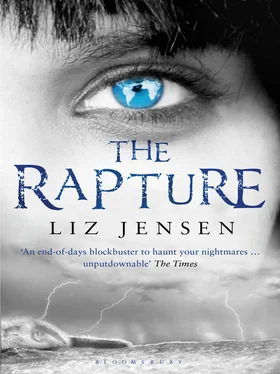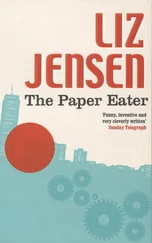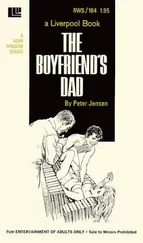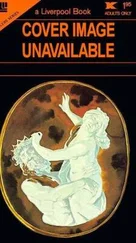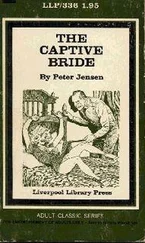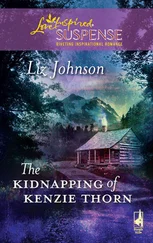‘It’s wonderful,’ says Bethany. She is staring at it, mesmerised. ‘You’ll remember it for ever. You’ll remember me too. I know you will.’ The strange light makes her face look as translucent and ghostly as rice paper.
‘We’ll get out of here, we’ll land somewhere safe, we’ll get you treated,’ I’m saying. But then, as the helicopter begins to arc in a new direction, I realise I have misunderstood her. Utterly and completely and—
‘Bethany, no!’
I slam my arm out to stop her but she has started to roll. It’s an almost languid movement. Balletic and calm. A smooth, considered rotation. Her eyes are wide open. She knows what she is doing.
I scream but no sound comes out. Then I scream again, aloud. But against the shriek of the engine, no one hears me.
Bethany keeps rolling, until she has rolled to the very edge of the world.
And then over it.
The crest of the giant wave has sluiced on, leaving in its wake a sheet of glassy, liquefied flame, bobbing with charred bodies and black detritus, a foul, fizzing stew of water and gas and heat. My eyes trace the arc of the falling girl silhouetted against the blinding brightness below. As its furnace blasts upward, scorching my skin, I see her cartwheel down through the vapour. The motion is slow, almost graceful.
Down and down. First she is a comma and then a speck.
And then a burning shard, gulped into the abyss.
And then nothing.
Then Frazer Melville has seen what’s happened. What I failed to see in time. The granting of the death-wish evident in Bethany from the moment I saw her, whose force I so fatally misjudged: that dark, calculated single-minded mission to end it. He’s shouting to Ned and Kristin. There’s commotion as the word spreads that she has gone. With a lunge, Frazer Melville has shot across and grabbed me. He grips me to his chest so I am trapped in his arms, squeezing a great wail out of me, a cry that will echo across the rest of my life, because I know already there will be no green fields in Bethanyland, no safe place for a child to play. Nothing but hard burnt rock and blasted earth, a struggle for water, for food, for hope. A place where every day will be marked by the rude, clobbering battle for survival and the permanent endurance of regret, among the ruins of all we have created and invented, the busted remains of the marvels and commonplaces we have dreamed and built, strived for and held dear: food, shelter, myth, beauty, art, knowledge, material comfort, stories, gods, music, ideas, ideals, shelter.
And there will be no Bethany.
From the crush of Frazer Melville’s arms, I look out on to the birthday of a new world. A world a child must enter.
A world I want no part of.
A world not ours.
Although the disaster that takes place in The Rapture is within the realms of possibility, the likelihood of extreme global heating happening so suddenly is small. However, in reality we face a far more potent and immediate threat. If climate change continues unabated, the consequences will be more devastating than most peole — including me — would care to imagine. Several books influenced me during the gestation of this novel, in particular Six Degrees by Mark Lynas, Heat by George Monbiot, The Revenge of Gaia by James Lovelock, The Weather Makers by Tim Flannery and Field Notes from a Catastrophe by Elizabeth Kolbert. For anyone wishing to explore the science further, I recommend the website RealClimate.org. And if you feel moved to take action — which I hope you will be — then joining Friends of the Earth ( www.foe.org.uk) and signing up to the IO:IO campaign ( www.IO:IO.uk.org) are great ways to start.
I am deeply grateful to all at Bloomsbury, my agent Clare Alexander and her colleague Lesley Thorne at Aitken Alexander Associates, as well as to Carsten Jensen, Matti Coleman, Gail Campbell, Polly Coles, Gina de Ferrer, Humphrey Hawksley, Lisanne Radice, Kate O’Riordan, Kitty and John Sewell and Morgan Todd for their insightful feedback on the manuscript at different stages.
I have quoted the work of Jose Luis Aragon and his colleagues about van Gogh’s perception of turbulence, but extrapolated from it in ways for which I hope they can forgive me. While all errors and liberties in the novel are my own I owe a huge debt of gratitude to the people without whose encouragement, specialist input and respect for the imperatives of poetic licence this book could not have been written. Nicholas Guyatt, author of Have a Nice Doomsday! , shepherded me through the world of Christian evangelism, while Rod and Cathy Sheard kindly gave me an early glimpse of the Olympic stadium. Psychiatrist Dr Mary-Jane Attenburrow offered invaluable advice on the medical front, while Anne Luttman-Johnson generously provided me with insights into paraplegia, and was a huge inspiration throughout the writing of the book. And through the website Sci-talk.0rg.uk I made contact with Dr Daniela Schmidt at Bristol University’s Department of Earth Sciences, whose passion for a fascinating subject and her facility to convey its complexities lit the creative fire and kept it burning.
And thank you, Carsten, for being the love of my life.
Liz Jensen is the acclaimed author of six previous novels, including Ark Baby (shortlisted for the Guardian Fiction Award), War Crimes for the Home and The Ninth Life of Louis Drax. She has been longlisted for the Orange Prize for Fiction three times and her work has been published in more than twenty countries.
‘A rollicking eco-thriller that successfully marries high-octane action with a prescient overview of the dangers of climate change. Ditching polemical tirades for a filmic immediacy, this smart, salient author creates a scenario in which environmental calamity is the backdrop to a gripping tale of love, death and religion’
Daily Mail
‘The Rapture makes chilling reading… Jensen writes with energy and chutzpah about the scarily possible… electric and elegiac.’
Independent
‘Combining the tensions of modern psychology with scientific speculation and social analysis in a speedy plot, Jensen puts me rather in mind of Margaret Atwood. There’s the same ability to keep the emotional observations sharp but sophisticated, and the same comic flouting of stereotypical femininity… a cracking read *****’
Daily Telegraph
‘The considerable achievement of The Rapture is to render its heroine so susceptible to physical or mental harm, and place her in such repeated peril, that you’re never quite confident until the last page that victory will be grasped… Beautifully structured… a masterclass on how to write an engaging thriller about a relevant contemporary issue while still respecting the reader’s brain cells.’
Guardian
‘Vivid… Jensen has proved herself a skilful, witty writer in earlier novels, and The Rapture is often an absorbing embodiment and exploration of our fears about climate change.’
Sunday Times
‘Paced like a thriller with elements of sci-fi, the supernatural and old-fashioned romance, this is a highly original yarn with a serious undertow that pulls its schlock-horror elements into something that is genuinely thought provoking and disturbing.’
Daily Express
‘A gripping literary thriller to see you through airport delays.’
Daily Telegraph Summer Reads
‘Liz Jensen’s novels are hard to label, beyond them all being wildly original, and her seventh is no exception… Gripping and crammed with ideas, with big, topical themes and well-drawn characters.’
Читать дальше
